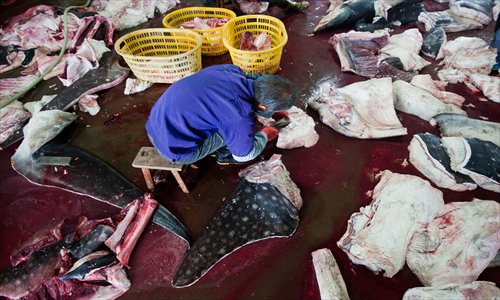Official refutes shark killing claims

Sitting on a stool in a pool of blood, a worker cuts up a whale shark to separate the skin, flesh and liver oil in a factory in Puqi, Zhejiang Province, on November 22, 2010. Photo: Courtesy of Paul Hilton and Alex Hofford from WildLifeRisk
A fisheries official from Wenzhou, Zhejiang Province refuted allegations that endangered species such as whale sharks were routinely being processed in a local plant, a comment criticized by an expert as from someone who "does not understand the laws."
Meanwhile, a local factory owner admitted that sometimes endangered sharks were caught and processed.
"There are no shark-hunting activities in Wenzhou and all sharks are bought from other coastal cities and from abroad. The long-existing local shark processing business exploits the fishing resources scientifically in accordance with the Law on Protection of Wildlife," the official, who asked to remain anonymous, told the Global Times Monday.
This came after a three-year investigation into the shark processing business at Puqi township of Wenzhou by Hong Kong-based conservation NGO WildLifeRisk. The group said that over 600 whale sharks are killed every year in a local factory, describing it as "the world's largest whale shark slaughterhouse."
Paul Hilton, a director of WildLifeRisk, told the Global Times that the shark fins are mainly transported to restaurants in Guangdong Province. Shark oil is sent to Hainan Province for further processing and packaging, which would then be traded to the US and Canada, while the meat would be sold to Italy.
"International trade of products from an endangered species is illegal according to the Convention on International Trade in Endangered Species of Wild Fauna and Flora (CITES), to which China is a signatory," Hilton noted, adding that basking sharks and great white sharks, which are also under the protection of CITES, are found in the factory as well.
Puqi is famous for its shark products in China and the business has been affected recently due to boycotts against shark products launched by NGOs, said an anonymous shark-processing factory owner in Puqi.
"Sometimes endangered species are caught and slaughtered, since workers can't tell whether a shark is under protection or not," he said, "I don't think it's against the law though."
Wang Yamin, a member of the International Union for Conservation of Nature and an assistant professor at Shandong University, said that it is still illegal to kill or process sharks if they are protected by CITES.
"The [Zhejiang] official may not understand our laws well by saying that there have been no violations against the Law on Protection of Wildlife. While species like whale sharks are not enlisted as endangered species under that particular law, they have protective identity under CITES," said Wang.
"It is easy to differentiate a whale shark from an ordinary shark as whale sharks are bigger and have white dots on their body. I'm afraid local businesses insist on such illegal deeds for more profits brought by sharks of larger size," Wang noted.
China became a signatory to CITES in 1981.
Alex Hofford, another director of WildLifeRisk, said he hopes consumers could be persuaded to reject shark-related products.
"There should be transparency so that people can make informed decisions about the products they buy," he said.